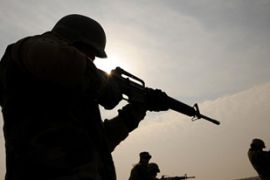Foreign troops die in Afghanistan
Attack hits Nato force in country’s north as parliament approves five new ministers.

The Norwegians’ deaths push the Nato death toll in Afghanistan this year to 318 compared to 520 for the whole of 2009, according to the AFP news agency’s tally.
In a separate attack on Monday, at least eight civilians were killed when a homemade-style bomb struck a minivan in the central province of Ghazni, Afghan police said.
Nato blames the rise in casualty numbers on expansion of its military operations and a more aggressive strategy in areas where the Taliban had previously been unchallenged.
Interior minister appointed
On the political front, Afghanistan’s lower house of parliament approved on Monday five new cabinet members, including General Bismullah Mohammadi as interior minister to replace Hanif Atmar.
Atmar was recently dismissed along with Amrullah Saleh, the intelligence chief, apparently for allowing fighters to elude a massive security operation and launch an attack on a national peace conference, or jirga.
Two nominees, one for transport minister and the other higher education minister, were rejected.
| In depth | |||||||||||||||||||||
|
Others approved included Anwar ul-Haq Ahady, the former finance minister, as commerce minister; Jamaher Anwary as refugee minister; Abdul Qudos Hamidi as public-works minister; and Asadullah Khalid, a former governor of Kandahar, to head the border and tribal affairs ministry.
There are still seven posts that need to be filled.
Reporting on the appointments from Kabul, Al Jazeera’s Zeina Khodr said: “People have been losing their support in the government because of rampant corruption. But these appointments are definitely a positive thing for [President Hamid] Karzai, who has been trying to get these nominees a vote of confidence in parliament.
“[Karzai] has been pushing for a wide-ranging peace process. He realises that the military option is not the only option, and that there is a need for some sort of political settlement and, to achieve that, he needs support from regional players and the international community.”
The mixed news from Afghanistan comes a day after Leon Panetta, the head of the US Central Intelligence Agency, cautioned that the war will be tougher and longer than expected.
In an interview to ABC television on Sunday, he acknowledged “serious problems” with the war, saying: “We’re dealing with a country that has problems with governance, problems with corruption, problems with narcotics trafficking, problems with a Taliban insurgency.
“We are making progress. But it’s harder and slower than anyone anticipated.”
‘Karzai-Haqqani meeting’
Noting that al-Qaeda’s leadership was now apparently weaker than ever, Panetta insisted Obama’s surge strategy, which will see the number of international troops on the ground peak at 150,000 in August, is the right one.
But he said the success or failure of Nato’s mission depended on whether the Afghan government, police and military could step up alongside Nato to help bring security and stability.
Panetta’s comments came as Al Jazeera reported that Karzai had met Sirajuddin Haqqani, leader of a major anti-government faction, in face-to-face talks.
Karzai’s office, however, denied that any such meeting took place.
Major-General Athar Abbas, the Pakistani army spokesman, also said he had “no knowledge of such a meeting taking place”.
The Haqqani network is described by the US as one of the three main anti-government armed groups operating in Afghanistan, alongside the Taliban and al-Qaeda.
